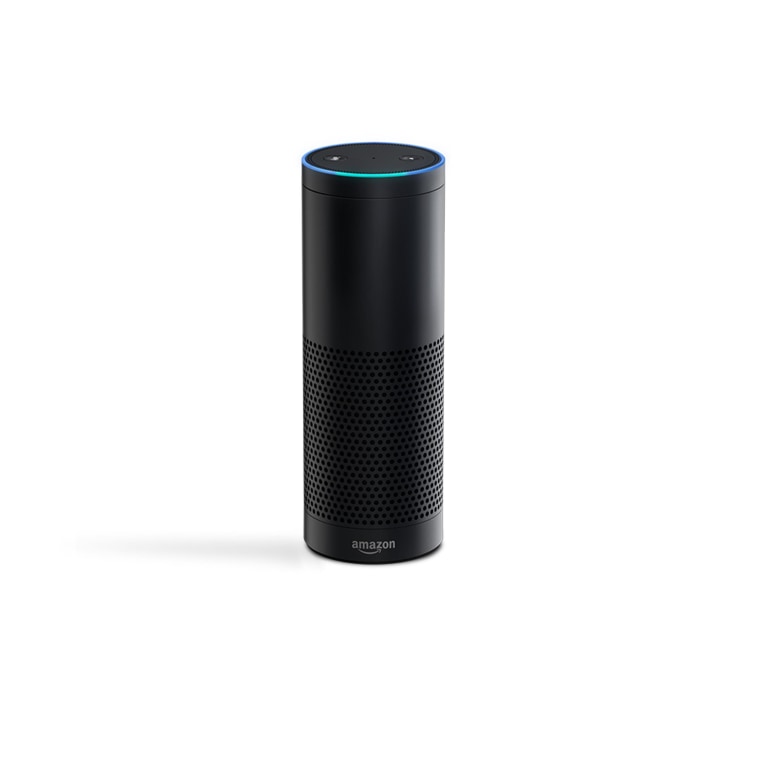The Amazon Echo is a voice-activated smart speaker that plays music, gives the weather forecast and updates its owner's shopping lists, among other everyday tasks.
But prosecutors in Arkansas believe one such virtual assistant may hold something far more crucial: data that can help in a murder trial.
The case against Bentonville man James Bates is gaining national attention after prosecutors confirmed there is an active warrant to obtain information from his Amazon Echo.
While Benton County prosecutor Nathan Smith told NBC News they're not trying to force Amazon to comply with the warrant — and the e-commerce giant says it has refused anyway — the case is putting a spotlight on how newer types of personal technology have become sought-after pieces of evidence.
Kim Weber, Bates' attorney, said that although he has nothing to hide, she is still worried about the issue of privacy. It's a familiar concern: How cellphones are used to track people and whether seizing certain information on them is legal has been taken up by various courts.
"It is disconcerting for me as a defense attorney to know that we are purchasing these wonderful items to help us in our home ... to help us in our quality of life, and then they can be turned around and ... used against us to charge us in crimes," Weber told NBC News on Tuesday.
She added that Amazon was right in protecting her client.
In Bates' case, prosecutors sought the Amazon Echo's electronic data from Nov. 21 to Nov. 22 of last year, when a homicide at his home occurred, to help piece together what happened.
Bates is charged in the murder of co-worker Victor Collins. Police said Bates had invited Collins and two other buddies over to watch football, and they drank beer and vodka.
One of the friends left, and Bates, Collins and the other friend got into a hot tub where they continued to drink until 1 a.m., according to an affidavit. Bates said he decided to go to bed, but woke up hours later and found Collins face down in the water.
Bates called 911, and detectives found Collins' body. The affidavit said he died of homicide by strangulation with a contributing cause of drowning.
But investigators noted that Collins was bleeding and bruised on his face, and that there was evidence of a struggle and a cover-up. They also found Bates made calls throughout the night to various numbers that didn't go through, which appeared inconsistent with him saying he was sleeping, according to the affidavit.
Bates told police the calls were so-called "butt dials."
The other friend who was with the pair had returned home by 12:30 a.m., his wife told investigators, and he showed no signs of physical struggle, the affidavit said. Bates was examined and there was bruising as well as scratches on his back, arms and abdomen, the document added.
Finally, police said, utility records showed an increase in water usage early in the morning, suggesting the patio had been sprayed down to eradicate evidence.
Bates pleaded not guilty in court in April and posted bail. He faces a trial next year.
While an Amazon Echo was located inside the home, prosecutors have not said exactly what they might be looking for to aid in the case. Police were able to access data on the device, and prosecutors have discussed with Amazon getting further data from it or the company's servers, where the information s stored.
Related: Microsoft Wins Major Court Battle Over Email Privacy
Amazon in a statement said it "will not release customer information without a valid and binding legal demand properly served on us. Amazon objects to overbroad or otherwise inappropriate demands as a matter of course."
Benton County prosecutors argue Amazon has no legal standing in Bates' case not to turn over pertinent information.
The Amazon Echo, by design, holds a wealth of knowledge. The Internet- and Bluetooth-enabled device is constantly listening. When someone gives the trigger word — usually the name Alexa — and then asks a question or makes a command, the virtual assistant does its best to comply.
And, in those moments, Alexa is also recording.
Craig Ball, an Austin, Texas, attorney and computer forensic examiner who owns an Amazon Echo, said he's able to go back to his recording history and listen to what he's commanded in the past. If a conversation was going on simultaneously or the TV was on, he can hear that as well.
That's why prosecutors would be interested in prying into an Amazon Echo — Alexa could in some ways be an alibi for someone or have recorded snippets of an incriminating conversation.
"If there was a quarrel going on, if an individual was on the phone at the same time, you might be able to hear that," Ball said. "While the command is being spoken, it's picking everything up."
But, for now, Benton County prosecutors say the data Amazon might have is not as important as other records, unrelated to the Amazon Echo, that have already been obtained — so there's no need to use litigation to get the company to surrender the data.
It's unclear how long Amazon stores customers' Alexa recordings.
Still, Ball said, people shouldn't have a reasonable expectation that their data is off limits when a third-party company holds it.
The issue of privacy and police seizing personal data and devices, including smartphones and computers, is only going to get thornier as people use more sophisticated technology in their routine activities, the American Civil Liberties Union cautions.
"Just as with mobile phones, the data these devices collect can paint an intimate picture of our inner and personal lives," said ACLU staff attorney Brett Max Kaufman. " ... Going forward the courts should be careful to understand and appreciate the important privacy concerns that these devices present."

